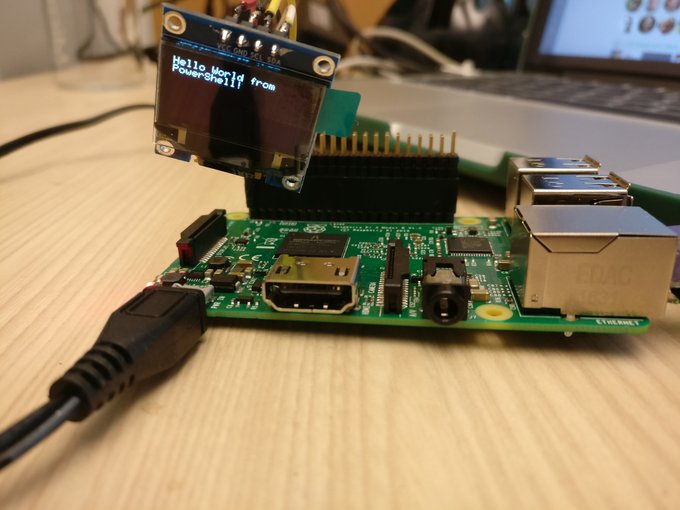PowerShell / Powershell Iot
Programming Languages
Projects that are alternatives of or similar to Powershell Iot
PowerShell-IoT
Note: PowerShell IoT is still in Preview
A PowerShell module for interacting with hardware sensors and devices using common protocols: GPIO, I2C & SPI.
Information
Goals
The main goal of this project is to provide a friendly interface for interacting with hardware sensors and devices using PowerShell.
That said, it was built as close to the metal as possible to keep the library broad enough to cover a range of sensors and devices.
The hope is that this module will be the foundation for other modules that will expose specific cmdlets for interacting with specific sensors and devices.
For example, a cmdlet stack to turn on a light bulb might be:
> Set-Light On # Your user types this / you make this cmdlet
> Set-GpioPin -Id 4 -Value High # You use this to make that^ / we make this cmdlet
> # Our code that makes that^
To see some examples of modules built on top of PowerShell IoT, see the Examples folder.
Supported platforms
Supported devices
- Raspberry Pi 3
- Raspberry Pi 2
Supported operating systems
- Raspbian Stretch
Documentation & Examples
Please see our docs folder here for an API reference, pin layout and other docs. For examples, checkout our examples folder.
Dependencies
This project relies on .NET Core IoT Libraries. It is a .NET library for interacting with Raspberry Pi's IO functionality.
Installation
PowerShell Gallery
You can grab the latest version of PowerShell IoT by running:
Install-Module Microsoft.PowerShell.IoT
Please note that since this module works with Hardware, higher privileges are required (run PowerShell with sudo, or as root user)
Then see the section on running.
If you want to write a module that uses PowerShell IoT, include it in the RequiredModules field of your module manifest.
GitHub releases
You can also manually download the zipped up module from the releases.
Then see the section on running.
AppVeyor
You can download the latest CI build from our AppVeyor build here. Go to the latest build, click on either of the images, then click on the artifacts tab. From there, you can download a zip of the latest CI build.
Then see the section on running.
From Source
Prerequisites
- PowerShell Core 6 or greater
- .NET Core SDK 2.0 or greater
- InvokeBuild
- A supported device like a Raspberry Pi 3 with PowerShell Core 6 on it
Building
NOTE: You can't build on ARM devices at this time so you will need to build on another machine and copy the build to the device.
- Clone/download the repo
- run
./build.ps1 -Bootstrapto see if you're missing any tooling - run
./build.ps1to build
At this point, you'll notice an out folder has been generated in the root of your repo.
The project is ready to be deployed to your device.
Deploying
We have included a helper script, Move-PSIoTBuild.ps1,
that will move the PowerShell IoT build over to your device.
This copy uses PSRP over SSH so make sure you're able to connect to your pi this way.
The Microsoft.PowerShell.IoT module will be copied to your $env:PSModulePath on your device.
Here's an example:
Move-PSIoTBuild.ps1 -Ip 10.123.123.123 # IP address of device
You can also easily copy examples in the Examples folder over using the -WithExample flag.
Just give a list of examples you want to copy over and it will move those to you $env:PSModulePath along with Microsoft.PowerShell.IoT:
Move-PSIoTBuild.ps1 -Ip 10.123.123.123 -WithExample Microsoft.PowerShell.IoT.Plant,Microsoft.PowerShell.IoT.SSD1306
Also, with the -Build parameter,
it will build/test/package your project before moving it.
NOTE: If you'd rather not use the script, simply copy the out/Microsoft.PowerShell.IoT to your device to get started.
Running
Start PowerShell:
pwsh
If you have the Microsoft.PowerShell.IoT module in your PSModulePath:
Import-Module Microsoft.PowerShell.IoT
Alternatively, just import the .psd1:
Import-Module /path/to/Microsoft.PowerShell.IoT/Microsoft.PowerShell.IoT.psd1
At this point you can now mess with the module:
Get-Command -Module Microsoft.PowerShell.IoT
Get-GpioPin 2 # gets the data from GPIO pin 2
Testing
You can run tests, but they require a particular setup. Here is how you run them:
./build.ps1 -Test
The setup required:
- For I2C: An Adafruit BME280 I2C or SPI Temperature Humidity Pressure Sensor
- For GPIO: Bend pins 26 and 22 to touch each other or connect them in some way
- For SPI: An Adafruit LIS3DH Triple-Axis Accelerometer
We currently have a build agent that will deploy PR code onto a test Raspberry Pi and run the tests found in the test directory.



